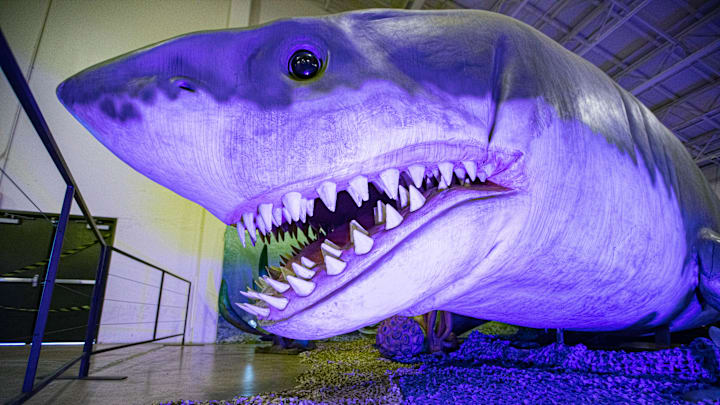For a long time, scientists believed that the megalodon—the biggest fish ever discovered—primarily ate whales. While the sea mammals were likely part of the prehistoric sharks’ diet, a new study published in Earth and Planetary Science Letters suggests that a lot more was on the menu.
To examine megalodon’s diet, researchers at Germany’s Goethe University Frankfurt examined zinc levels in the creature’s 18-million-year-old teeth. The only way to get the mineral into the body is through ingestion; therefore, experts can get an idea of an animal’s food sources by studying the atomic variations (isotopes) of zinc. Muscles and organs contain more zinc-64 isotopes than zinc-66, and as a result, animals with meat and fish-heavy diets will have more zinc-64 in their systems.
According to a statement from Dr. Jeremy McCormack, the study’s lead author, the team compared the teeth of prehistoric sharks, living sharks, and other animal species. The scientists didn’t know what zinc isotope ratios looked like in creatures at the bottom of the food chain millions of years ago, so this approach gave them a better understanding of predator-prey relationships in the Miocene era.
They found that while megalodon was at the top of the food chain, the gigantic shark’s eating habits didn’t differ much from lower-level carnivores. Its eating habits were a lot more diverse than scientists initially thought, and it likely ate whatever it could get its jaws on. In addition to whales, it may have made a meal out of fish, even if they were easy, low-calorie targets.
The research also shows that megalodons in different areas had different diets. Fossils recovered from one German city showed more signs of the sharks preying on animals that were lower on the food chain compared to those found in a different part of the country. This is likely due to regional differences in food availability.
In short, megalodon wasn’t just a whale-eater—it was an opportunistic predator that adapted to its surroundings. Scientists have much more to learn about the extinct giant, but at least they’ve gotten a little closer to understanding the fish’s role in the prehistoric ocean ecosystem.
Read More About Sharks:
